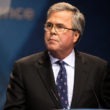Senator Hothead—Arizona Republican senator and presidential candidate John McCain hadn’t been in town to cast a Senate vote in five weeks when he jumped on Senator John Cornyn (R-TX) for slowing down final negotiations on the bipartisan immigration bill, thereby delaying McCain’s departure for a New York fund-raising event. McCain wanted to attend a midday press conference and leave, but Cornyn’s attention to detail was delaying the press conference. A spokesman for McCain admitted that the two had a heated exchange.
Right-wing blog Powerline tracked down the specifics. “This is chickenshit,” McCain said to Cornyn. “I think it would expedite things if you would leave the room, Senator, so we can get along with finishing this up.” Cornyn said he had been working on the bill for three months and McCain couldn’t “parachute in” and tell him to leave. “Fuck you!” McCain responded. “I know more about immigration than anyone else in this room.”
The incident recalls that McCain had earned the tag “Senator Hothead” during the 2000 presidential campaign, when his volatility provided the factual basis for Karl Rove’s pre-primary whispering campaign against the senator in South Carolina. The Bush campaign floated rumors that McCain wasn’t mentally stable enough to serve as president. (The Rove team also promoted the rumor that McCain had fathered an illegitimate black child.)
McCain has reason to be frustrated. At a time when candidates equate money with viability, McCain trails former Massachusetts governor Mitt Romney and former New York mayor Rudy Giuliani. According to opensecrets.org, Romney has raised $23,434,634; Giuliani has raised $16,623,410; and McCain, $13,087,559. Nor can McCain crack Giuliani’s lead in the polls, though he has spent $8,379,214 to Giuliani’s $5,180,799. In major independent polls, Giuliani leads McCain with margins ranging from 14 percent to 2 percent and an average lead of 6 percent. Giuliani is even in a dead heat with McCain in South Carolina, despite McCain’s pandering to Christian Right voters, who have traditionally dominated Republican primary politics in the state and are expected to reject Giuliani’s moderate position on abortion and gay marriage.
There’ll Always Be an England—“Include a large roof,” Middle East scholar Toby Dodge said recently in the British daily the Guardian about the new U.S. Embassy in Baghdad. The 104-acre campus on the bank of the Tigris will house 615 members of the diplomatic corps behind reinforced blast-proof walls. Costing $592 million, the embassy will be larger than the Vatican and a reminder of the neocon dream of reshaping the Middle East. It’s also one of the few U.S. projects in Iraq likely to be finished on time and within budget. Dodge, an Iraq specialist who has published two books on the country, predicts that the U.S. will remain in Iraq through the end of the next presidential term, “until helicopters come to airlift the last man and woman from the roof.”
Dodge, always something of a pessimistic realist regarding Iraq, has observed that the number of Iraqi leaders who have left their country and are now living in Britain illustrates the rampant corruption in Iraq. And, it would seem, the lack of faith in the future, as Iraqis with the resources to flee do so. The Times of London describes the exiles’ homes in England as “bolt holes” for Iraqi politicians.
The bolt-holers include Adnan Pachachi, the former head of the Iraqi Governing Council, who found it safer to fulfill his obligations as a member of Iraq’s parliament from homes in Chelsea and Abu Dhabi. Another is Sharif Ali, the head of the Iraqi Constitutional Monarchy Movement, who lives in West London. Former Prime Minister Iyad Allawi has a home in Kingston-upon-Thames. Ibrahim al-Jaafari, another former prime minister, also has a London home. As does his former spokesman Laith Kubba, who was part of the cabal of exiles who helped sell the war to the Bush administration; he now divides his time between London and Washington. WhenNew York Times reporter Dexter Filkins did an August 2006 profile of Ahmad Chalabi—the godfather of the Iraq War—the interview was done in Chalabi’s Mayfair apartment. Chalabi, the man American neocons assumed would slide into power when Saddam fell, is currently in Iraq. But Filkins has put in more time there over the past two years than has the former exile leader. According to Sharif Ali, “half of the Iraq government is abroad at any one time.” In late May, Iraqi President Jalal Talabani arrived in the U.S. for a medical checkup and a three-week vacation.






0 Comments